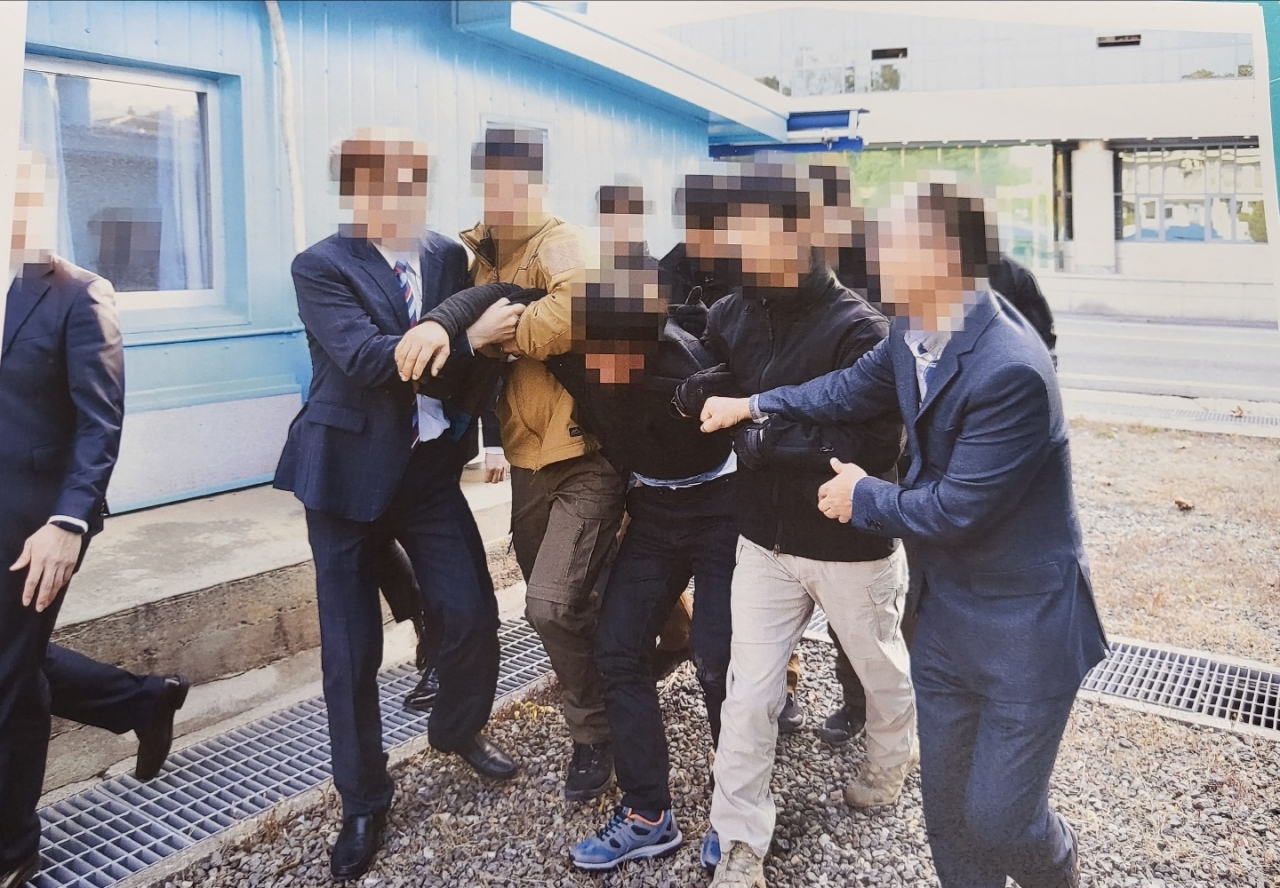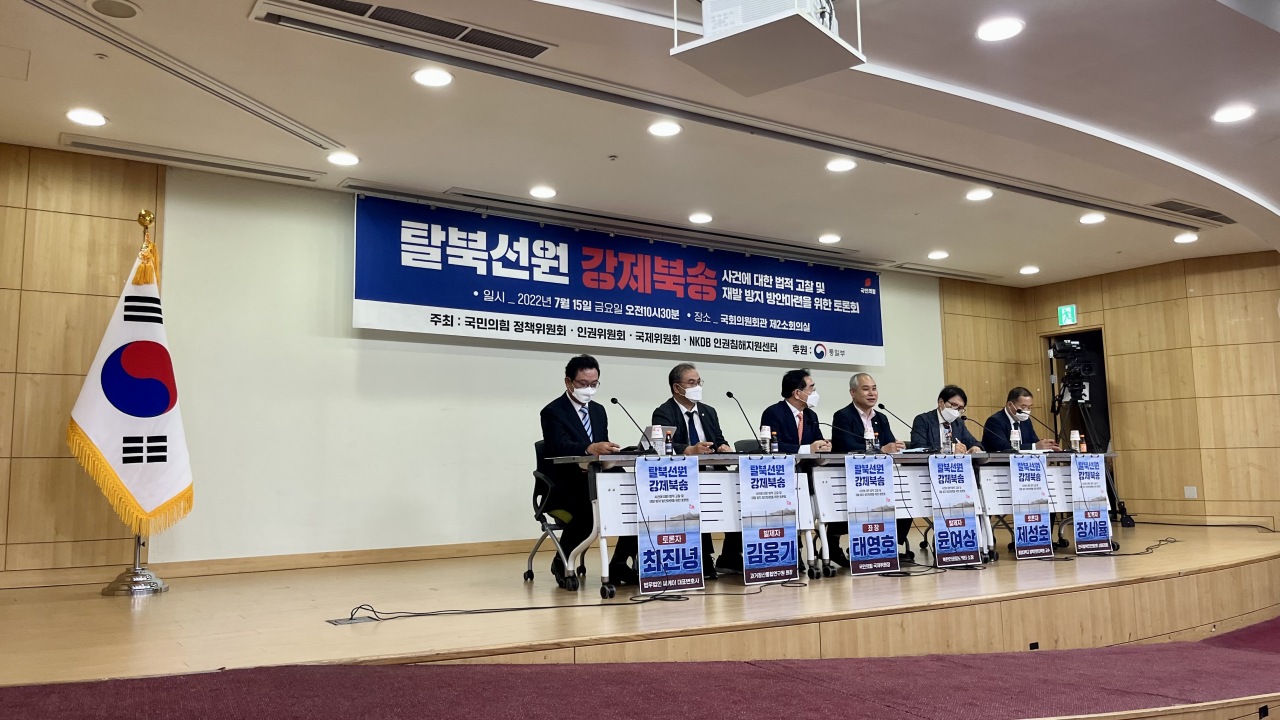‘I couldn’t sleep,’ defector says of images of North Koreans resisting deportation
By Kim ArinPublished : July 15, 2022 - 21:17

A North Korean defector told a forum Friday that he was “appalled” by the newly released photographs of two North Koreans being forcibly handed over to North Korea through the border village of Panmunjom in November 2019.
The photographs, made public by South Korea’s Ministry of Unification on Tuesday, showed the two men struggling as they were dragged toward North Korean soldiers waiting on the North Korean side of the demarcation line. One of them collapsed. Their faces were blurred to cover their identities, but according to police accounts they were blindfolded and bound with ropes.
South Korean authorites at the time repatriated the two North Korean men in their 20s, after concluding they were criminals who killed 16 other crew members of the squid fishing boat as they fled North Korea. In handwritten statements both said they wished to settle in South Korea.
What happened to the fishermen is every North Korean defector’s “worst fear,” said Jang Se-yul, the president of the National Association of North Korean Defectors.
On the day the images were out, he said he was “unable to sleep.”
“I know that about 30,000 other North Korean defectors in South Korea shuddered at these images, as I have,” he said.
He said that if he were in their place, he would have “chosen death” over what would await him in North Korea -- an execution.
“I would have taken my own life if I knew I was being returned to North Korea,” he said. “These fishermen even had that choice to decide their own fate taken away from them.”
He said that he, as well as many fellow North Koreans who were able to make it to the South, have fought against the Chinese government’s forcible repatriation of defectors to North Korea.
“The very cruetly that we most dread, and were fighting against happened here in this country we are grateful to call home,” he said.
“What the deportation by the South Korean government tells people of North Korea is that South Korea is no longer a safe homeland where they can seek refuge.”
On the claims that the fishermen were sent back because they were criminals, he said, “North Korea is not a normal country.”
“I know people back home who stole and broke laws to survive and feed their family on their ways to eventual escape,” he said.
He said that of argument also seemed to cater to the prejudice against North Korean defectors. “If you look at studies North Korean defectors are actually more likely to fall victim to crimes than the average South Korean,” he said.
“The worst criminals are Kim Jong-un and his father. And they were returned to be murdered at their hands,” he said.

At the same forum, Yoon Yeo-sang, the president of the Database Center for North Korea Human Rights, said that the circumstances revealed so far were “already fraught with possible human rights violations.”
“Our authorities at the time admitted to arresting and deporting the two men based on the grounds that they were violent criminals -- although whether that’s true or not remains disputed -- which is not very convincing,” he said.
He said that in the entry interviews North Korean defectors would claim that they had come here to escape conviction in North Korea, to make their case that they had no intentions of ever returning.
“Since opening in 2003, our database has documented more than 79,000 cases of human rights violations involving North Korea. This is the first case in which the South Korean goverment is the potential violator,” he said.
He said the Center was committed to staying politically neutral, but that the principle of political neutrality “does not mean not choosing sides between the victim of the human rights abuse and the abuser.”
He said that the killing of a Ministry of Oceans and Fisheries official named Lee Dae-jun by North Korea, which also took place during former President Moon Jae-in’s tenure, has made progress by comparison with at least one court victory to date.
“That was possible because the fisheries official has a family who is fighting for him. The two deported men, on the other hand, don’t,” he said. “The job of the human rights watchers is to speak for victims who cannot speak for themselves.”
The director of the Institute for Transitional Justice and Integration, Kim Woong-gi, agreed that sending two fishermen back to North Korea to a “highly probable abuse” raised serious human rights concerns.
“The authorities who were in charge have yet to offer an acceptable explanation other than that the young North Korean men were criminals, and that their intentions to defect did not appear sincere,” he said.
“Neither of those explanations addresses why that decision was kept secret from the press, how the determination that they were criminals was made in just three days, and why they treated the way they did,” he said.
Rep. Tae Young-ho, a former senior diplomat for North Korea who fled to seek asylum in South Korea in 2016, said how South Korea responds to the deportation case would send a “strong message” to the international community.
“How this case comes to a close would set off reverberations beyond South Korea. The Kim Jong-un regime itself will be closely watching,” said the North Korean defector-turned-lawmaker.
“The conclusions South Korea reach would set an incredibly crucial precedent for other countries -- especially countries like China, Russia and Vietnam that often repatriate North Korean defectors against their will -- to follow in how they treat North Korean defectors, who are already among those more vulnerable.”
By Kim Arin (arin@heraldcorp.com)



![[Exclusive] Korean military set to ban iPhones over 'security' concerns](http://res.heraldm.com/phpwas/restmb_idxmake.php?idx=644&simg=/content/image/2024/04/23/20240423050599_0.jpg&u=20240423183955)




![[Herald Interview] 'Amid aging population, Korea to invite more young professionals from overseas'](http://res.heraldm.com/phpwas/restmb_idxmake.php?idx=644&simg=/content/image/2024/04/24/20240424050844_0.jpg&u=20240424200058)

![[Pressure points] Leggings in public: Fashion statement or social faux pas?](http://res.heraldm.com/phpwas/restmb_idxmake.php?idx=644&simg=/content/image/2024/04/23/20240423050669_0.jpg&u=)









